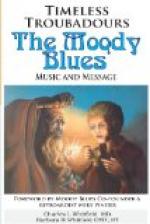Though the Count of Poitiers is the first troubadour known to us, the relatively high excellence of his technique, as regards stanza construction and rime, and the capacity of his language for expressing lofty and refined ideas in poetical form (in spite of his occasional lapses into coarseness), entirely preclude the supposition that he was the first troubadour in point of time. The artistic conventions apparent in his poetry and his obviously careful respect for fixed rules oblige us to regard his poetry as the outcome of a considerable stage of previous development. At what point this development began and what influences stimulated its progress are questions which still remain in [7] dispute. Three theories have been proposed. It is, in the first place, obviously tempting to explain the origin of Provencal poetry as being a continuation of Latin poetry in its decadence. When the Romans settled in Gaul they brought with them their amusements as well as their laws and institutions. Their scurrae, thymelici and joculatores, the tumblers, clowns and mountebanks, who amused the common people by day and the nobles after their banquets by night and travelled from town to town in pursuit of their livelihood, were accustomed to accompany their performances by some sort of rude song and music. In the uncivilised North they remained buffoons; but in the South, where the greater refinement of life demanded more artistic performance, the musical part of their entertainment became predominant and the joculator became the joglar (Northern French, jongleur), a wandering musician and eventually a troubadour, a composer of his own poems. These latter were no longer the gross and coarse songs of the earlier mountebank age, which Alcuin characterised as turpissima and vanissima, but the grave and artificially wrought stanzas of the troubadour chanso.




